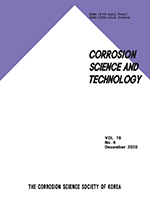|
Home > Journal Search
|
||||||||||||||||||
 | Rm. 603, New B/D, KOFST Bldg., 22, Teheran-ro 7Gil, Gangnam-Gu, Seoul 06130, KOREA Tel: +82-2-539-5869 | Fax: +82-2-555-4579 | Email: cst@j-cst.org Copyright © CSSK All Rights Reserved. |
 This is an Open-Access article distributed under the terms of the Creative Commons
Attribution Non-Commercial License which permits unrestricted non-commercial use, distribution, and reproduction in any
medium, provided the original work is properly cited.
This is an Open-Access article distributed under the terms of the Creative Commons
Attribution Non-Commercial License which permits unrestricted non-commercial use, distribution, and reproduction in any
medium, provided the original work is properly cited.This program is running Internet Explorer 4.0 and later and goolge Chrome and Apple Safari and Opera and Firefox web browser.


